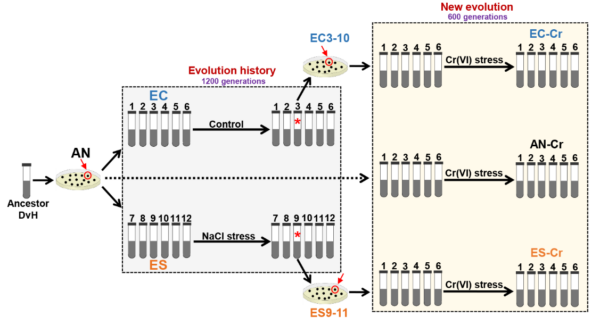
Researchers identified important genes for improving Chromate resistance in genetically diverse bacteria through experimental evolution
Science
Chromate is one of the most common heavy metal pollutants of soil and groundwater. Desulfovibrio vulgaris is a sulfate-reducing bacterium that plays an important role in cycling elements, and could be used in the bioremediation of chromate pollution. Key functional genes involved in chromate resistance are largely unknown, and how the genetic differences of microbes affect their adaptation to chromate stress is unclear. In this study, scientists propagated genetically different Desulfovibrio vulgaris populations under chromate stress. They found some potentially important genes for chromate resistance. They also found that the genetic differences of the bacteria affected their adaptation to chromate stress.
Impact
This study identified some potentially important genes for improving chromate resistance. Scientists can modify the genomes of bacteria to get more efficient chromate elimination strains. These strains may be used in the bioremediation of chromate pollution. This study also indicated the important role of genetic backgrounds in chromate adaptation. This will allow scientists to better predict how bacteria will adapt to various environmental stresses.
Summary
The potential of Desulfovibrio vulgaris in heavy metal bioremediation such as chromate reduction was reported previously, however, experimental evidence of key functional genes involved in chromate resistance are largely unknown. Given the genetic divergence of microbial populations in nature, how this divergence affects the microbial adaptation to a new environment such as chromate stress is very limited. In this study, three groups of genetically diverse Desulfovibrio vulgaris populations with or without prior experimental evolution histories were propagated under chromate stress for 600 generations. Whole population genome resequencing of the evolved populations revealed the genomic changes underlying the improved chromate tolerance. Pre-existing genetic divergence of the starting clones strongly influenced evolution under chromate stress conditions.
Contact

Jizhong Zhou, George Lynn Cross Research Professor; Director, Institute for Environmental Genomics (IEG)
Department of Microbiology & Plant Biology, University of Oklahoma
jzhou@ou.edu

Aifen Zhou
Institute for Environmental Genomics, Department of Microbiology and Plant Biology, University of Oklahoma
aifen.zhou-1@ou.edu
Jizhong Zhou, George Lynn Cross Research Professor; Director, Institute for Environmental Genomics (IEG)
Department of Microbiology & Plant Biology, University of Oklahoma
jzhou@ou.edu
Funding
This material by ENIGMA- Ecosystems and Networks Integrated with Genes and Molecular Assemblies (http://enigma.lbl.gov), a Science Focus Area Program at Lawrence Berkeley National Laboratory is based upon work supported by the U.S. Department of Energy, Office of Science, Office of Biological & Environmental Research under contract number DE-AC02-05CH11231.
Publications
W. Shi, Q. Ma, F. Pan, Y. Fan, M.L. Kempher, D. Ning, Y. Qu, J.D. Wall, A. Zhou and J. Zhou. “Genetic basis of chromate adaptation and the role of the pre-existing genetic divergence during an experimental evolution study with Desulfovibrio vulgaris populations.” mSystems 6:e00493-21 (2021). [DOI: 10.1128/mSystems.00493-21]
